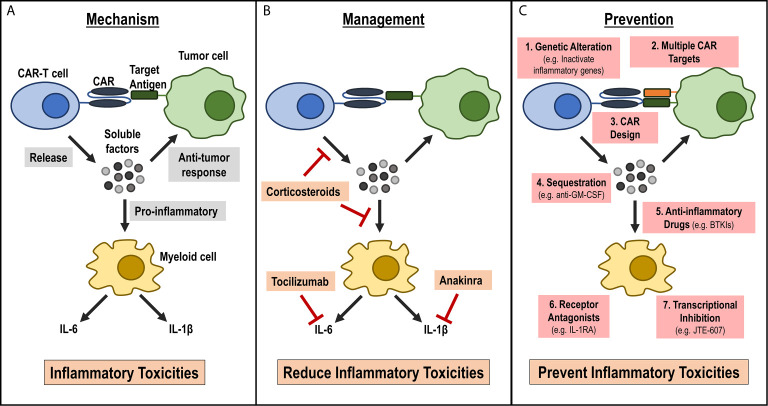Figure 1.
Current understanding of mechanism for inflammatory toxicities during CAR-T cell therapy, current management strategies and future strategies for prevention. (A) Mechanism: Activated CAR-T cells release soluble factors upon CAR engagement with target antigen. These soluble factors can aid in the anti-tumor response, or they can activate bystander myeloid cells. Activated myeloid cells secrete inflammatory cytokines, such as IL-6 and IL-1β, that lead to the inflammatory toxicities observed in patients infused with CAR-T cells. (B) Management: Current management strategies focus on reducing inflammatory cytokines or cytokine signaling pathways by either using anti-inflammatory drugs, such as corticosteroids that may reduce inflammatory cytokines release by CAR-T cells or myeloid cells or by targeting specific cytokine receptors, such as IL-6R by tocilizumab and IL-1R by anakinra. (C) Prevention: New approaches that focus on preventing the onset of CRS. These strategies include: 1) modifying CAR-T cells during manufacturing such as genetic alterations to inactivate inflammatory genes, 2) designing CARs with novel domains that are less inflammatory, 3) targeting multiple antigens on tumors to reduce on-target off-tumor activation, 4) inhibiting pro-inflammatory CAR-T cell factors using antibodies (e.g. anti-GM-CSF), or inhibiting myeloid cell activation by 5) using small molecule inhibitors (e.g. BTKI), 6) expressing inflammatory cytokine receptor (e.g. IL-1R) on CAR-T cells or 7) using myeloid cell-specific transcriptional Inhibitor (e.g. JTE-607).

